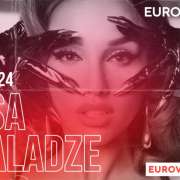Georgia’s Eurovision representatives take a stand on the country’s political crisis
Georgia is at the heart of a serious political crisis that erupted following the recent elections. Despite the ruling party’s victory, the country’s president and the pro-European opposition refuse to accept the election results, accusing the government of fraud and authoritarian rule. This situation has sparked daily protests, with thousands of citizens flooding the streets of Tbilisi and other cities, demanding free elections, political transparency, and a clear European trajectory for the country. The crisis has been further aggravated by the influence of Russia, which many Georgians perceive as a threat to their independence and democracy.
Supporting the Pro-European Opposition
Many artists who have participated in Eurovision have sided with the pro-European opposition, expressing their support for the protests and the people’s demands for greater democracy and a European orientation. Among them are:
- 2009: Stephane and 3G were selected in 2009 to represent Georgia with a politically charged song against the Russian president, who had invaded their country at the time. Naturally, they stand with the pro-European opposition, being among the first to show their support for the citizens’ fight for change by sharing messages of solidarity.
- 2015: Nina Sublatti, a strong voice in the arts, has been actively using social media to call for unity and a turn toward Europe.
- 2023: Iru, especially popular with the younger generation, has made her song a symbol of hope. She has openly supported the youth demonstrating in the streets.
These artists have used their platforms to promote European ideals and criticize the current political climate. Many of them have become symbols of political resistance in Georgia.
Supporting the Pro-Russian Government
On the other side, some artists have openly supported the government, provoking strong reactions. Examples include:
- 2008: Diana Gurtskaya has expressed support for Russia, raising many questions about her political stance.
- 2017: Tamara Gachechiladze has been accused of being a “propagandist,” with her statements reinforcing the government’s agenda.
- 2024: Nutsa Buzaladze, the country’s most recent representative, caused outrage with her public statements in favor of the ruling party.
These artists align with the government’s pro-Russian policies, emphasizing the need for “stability” and the “preservation of traditions.” However, their stance has been seen as divisive by many citizens.
A Divided Artistic Community
The artistic community in Georgia mirrors the country’s deep political and social polarization. While some choose to support the opposition and amplify the people’s hopes for a European future, others remain loyal to the pro-Russian government, bolstering divisive rhetoric.
The political crisis in Georgia has highlighted the role of artists as active citizens, with their positions sparking discussions both domestically and internationally. Whether as supporters of a pro-European course or the pro-Russian government, these artists demonstrate how music and politics are often deeply intertwined.
Stay tuned to Eurovisionfun for all the latest updates!






Leave a Reply
Want to join the discussion?Feel free to contribute!